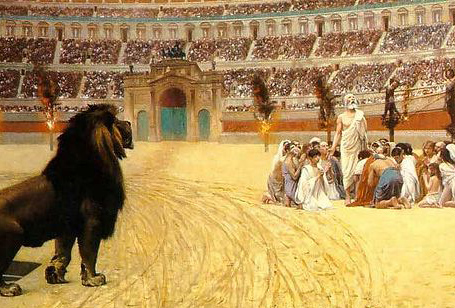 |
Apostles Gather for the Dormition of Mary
and the Council of Jerusalem
|
It has been 7 years since the Apostles left Jerusalem. St. Peter met with much success in Rome. But Simon Magus-- the magician from Acts (cf. Acts 8) appeared in Rome, confronting Peter, his old enemy, causing turmoil and riots to break out. The problem grew to the point that emperor Claudius expelled all Jews--- not making a difference between Christians, Jews, or Gnostics. Peter headed back to Jerusalem by way of Corinth doing some preaching there.
There may have been a plan for all the Apostles to gather back in Jerusalem at this time, 49 AD for the first council. It can't be documented that all the Apostles were present, but there may be a clue in that tradition holds that all the Apostles were present for the death of the Blessed Virgin Mary.
Both may have coincided. Maybe there were signs that her time was short. They all wanted to be there, and probably thought it practical, at the same time have a council to deal with the problems they were having with the preaching and controversies of the Mosaic law.
Remember they were mainly fishermen and were not prepared to debate the Bible like scholars, so this may have been an opportunity to consult on particular questions.
There is a tradition that St. Thomas came late, after the Blessed Mother's dormition, and wanted to see the body. Recalling the doubting, he had at the resurrection, but there was no body to be found, thus her body was Assumed into heaven, her body in heaven like her son, she is now sitting at his right hand, as Queen Mother already established by Jewish tradition, that the Mother was queen and sits at the king's right side.
Jesus foretold his mother’s place because it was established by Sacred Tradition by God the Father in the Old Testament.
“But to sit on my right hand, or on my left, is not mine to give to you, but to them for whom it is prepared.” (Mark 10:40)
All the Apostles were converting Gentiles, except St. James "the just,” who stayed in Jerusalem, so there was little doubt that they were doing the right thing, but how to address the questions they were dealing with was needed. James living in Jerusalem sought a compromise, with few a requirements, because he was dealing with only Jews in Jerusalem.
St. Paul returned to Antioch after the council. Peter followed him but started to avoid eating with the Gentiles, probably intimidated by the strength of personality of James, who was the “brother” (cousin) of Our Lord, and so admired by the Jews.
Soon Paul confronted Peter "to his face" (cf.Galatians 2:11) about him giving into human respect and avoiding eating with Gentiles. Obviously St. Peter wasn't rejecting his teaching, which was just confirmed in council, but Paul was confronting a weak man, in over his head. Peter must have thought often :”Who am I? A fisherman. Telling people how to live? Opposing Mosaic Law?” By his insecurities he failed in this case, to follow what he taught.
I would think St. Paul was more of an encouragement than a hindrance. Paul encouraged Peter to trust in God who chose him, Paul was there to firm up Peter, who in turn was in the office to firm up all the Church.
Jesus predicted this:
“Simon, Simon, Satan has asked to sift each of you like wheat. But I have prayed for you, Simon, that your faith will not fail. And when you have turned back, strengthen your brothers.” (Luke 22:31-32)
St. Peter, being humble enough to take the correction, didn't seem to miss a beat. He continued to live and evangelize in the region during the reign of Claudius, about 7 years, before returning to Rome. Rome would be impossible to return to until Claudius died, since all Jews were expelled. After the death of Claudius the ban was lifted.
continue to next chapter










